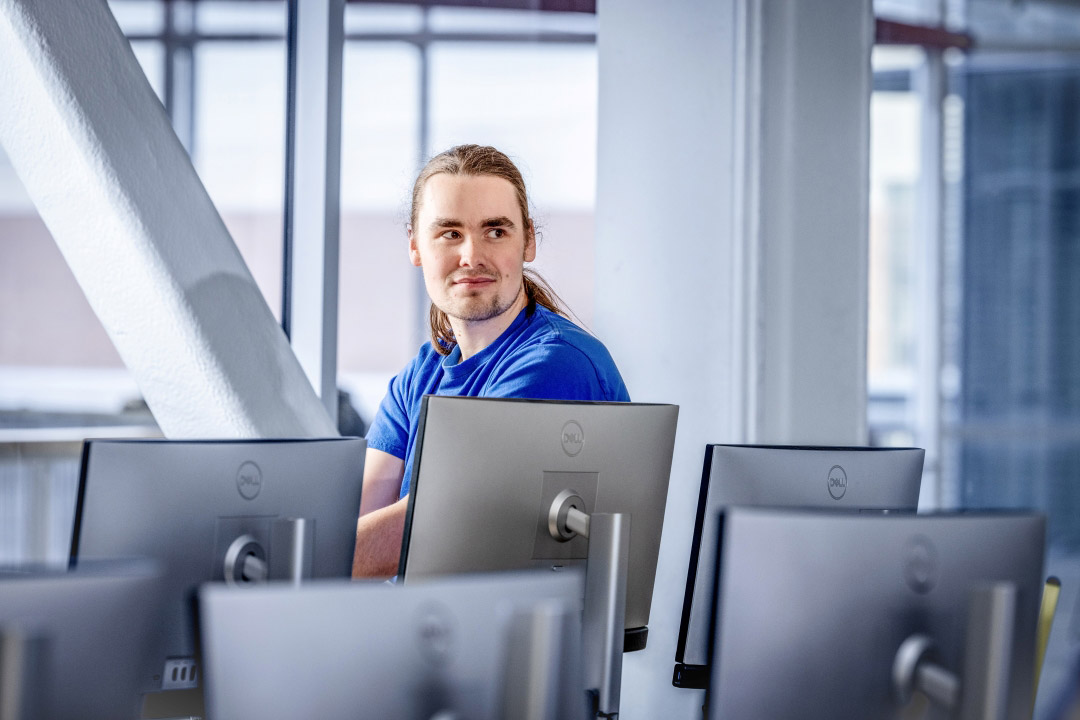RIT students are inspired to build a more open future
Adrian Edwards is one of many RIT students collaborating on free and open source projects
Scott Hamilton/RIT
Adrian Edwards, a fifth-year computer science major, is passionate about the open source community at RIT. Every week, he holds FOSS Hours in RIT’s SHED to collaborate with other students on open source projects.
Adrian Edwards is an open book. Every week, the computer science student can be found in RIT’s SHED working on a free and open source software (FOSS) project that could improve the campus and the world.
Since he got to RIT five years ago, he’s made open and free culture a big part of his life—from incorporating it into his degree to running FOSS Hours every Wednesday evening. At FOSS Hours, any student can stop by to learn and work on open projects.
RIT has a long history and culture of academic and extracurricular work in open source. Edwards hopes to pass his passion on to other students when he graduates in May and starts a job at Red Hat.
“I love the open source spirit,” said Edwards, who is earning a combined accelerated bachelor’s/master’s degree in computer science. “I want to encourage students to get involved and help solve problems around them. Participating in open projects is a great way to meet people and contribute. Be the change you want to see.”
An open source community
When Edwards learned that RIT was the first university in the country to offer an immersion and a minor in FOSS and free culture, he knew that he’d found the right place. He started by adding those courses to his degree and eventually became a teaching assistant in the area.
Edwards explained that open source is bigger than most people assume, with a majority of top organizations relying on open source servers and operating systems. The idea of free culture goes a lot deeper than that tech—it’s also about the people and communities behind the scenes who help keep things functioning smoothly.
“A lot of people connect the free part to money, but it’s also about freedom,” said Edwards, who is from Lake Oswego, Ore. “I think people are starting to see the benefit of being able to control what runs on their computers. There’s a lot of benefits and I know that code won’t be slipped in without my knowing.”
Edwards said he enjoys open data because it can be used by students to build useful campus software. He participates in RIT’s annual BrickHack hackathon and he’s been helping another student develop a bus schedule app.
Edwards also connected with RIT University Advancement when he wanted to fundraise for the FOSS community during ROAR Day. That conversation turned into a project to develop a ROAR Day URL Creator. The tool makes it easier for ambassadors to collect gifts from potential donors.
Maria Weir, a third-year double major in sociology and anthropology and public design in the individualized program, regularly attends FOSS Hours. She met Edwards through RIT’s Disability Culture Club and said the collaboration has been the driving force behind her capstone’s technical planning.
Weir is working to improve accessibility on campus by creating a map and catalog of what she calls access points—elevators, wheelchair lifts, and automatic door buttons. Her site will crowdsource out-of-service reports, share them with Facilities Management Services, and provide updates on work orders.
“I’m one of the more tech-illiterate people at RIT, so making a website as my final project was incredibly intimidating,” said Weir, who is from Nashville, Tenn. “FOSS Hours is like a collaborative, casual study hall where people work on their own projects but also share ideas.”
In June, Edwards will head to Boston to start as a software engineer at Red Hat in its Open Source Program Office. He’ll be working on the CHAOSS project, which stands for the Community Health Analytics in Open Source Software. In that role, he will use metrics to measure the health of different open source communities in order to help mitigate vulnerabilities.
Edwards credits RIT’s FOSS community for helping him land an internship and a full-time offer with Red Hat. He suggests that everyone start using more open projects on their machines.
“Then, if you encounter a problem, you can actually follow the trail, join a community, and figure out how to help fix it,” said Edwards. “Get involved and you can help make a difference in the world.”
About Open at RIT
In 2020, RIT establish the Open@RIT initiative dedicated to supporting all kinds of “open work,” including—but not limited to—open source software, open data, open hardware, open educational resources, Creative Commons licensed work, and open research. FOSS@MAGIC works with students to promote FOSS development.
To get involved with RIT’s open community, search “open source” in RIT’s student Discord hub, join the #rit-foss channel on Libera.chat, or join the Telegram group.














